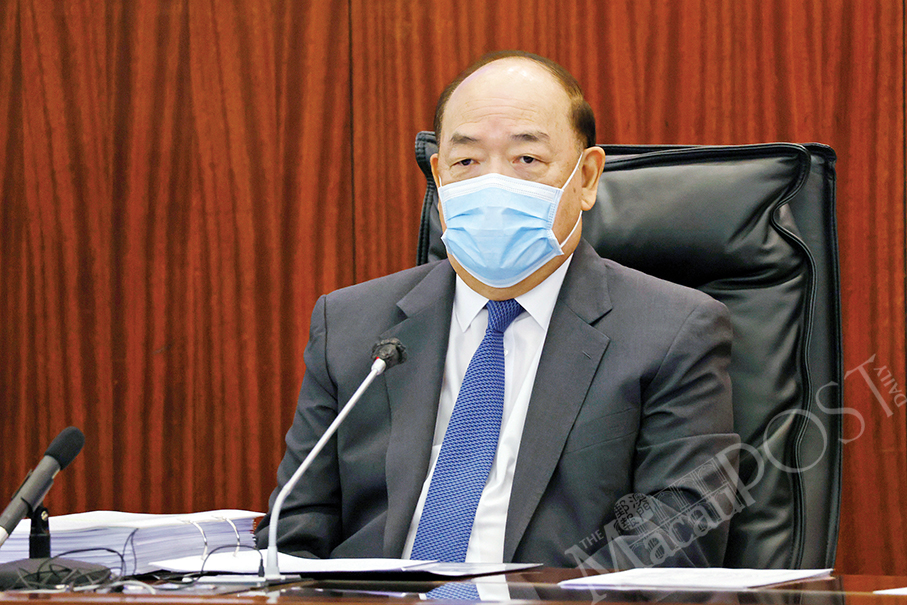Chief Executive Ho Iat Seng said yesterday that the Macau government would study the possibility of once again allowing foreign nationals from more countries to travel to Macau subject to hotel quarantine provided that Macau’s COVID-19 situation remains stable.
The chief executive also pledged that his government will continue to ask the central government to allow again the organisation of mainlanders’ tour groups to Macau and to enable mainlanders from more cities to travel to Macau with an Individual Visit Scheme (IVS) travel permit.
Ho made the remarks during a Q&A session in the Legislative Assembly’s hemicycle yesterday, during which he answered questions from 31 lawmakers. The speaker of the 33-member legislature customarily refrains from asking questions.
Ho reaffirmed that for the time being Macau can only allow tourists from the mainland to enter the special administrative region quarantine-free because of its COVID-19 prevention and control requirements.
Currently, all those arriving in Macau from foreign countries and the Chinese regions of Hong Kong and Taiwan, as well as areas that are affected by local COVID-19 outbreaks in the mainland, must undergo seven days of hotel quarantine plus three days of self-health management.
Non-resident foreigners, i.e., foreign nationals without a Macau ID card, in general are currently still barred from entering Macau, except those in certain special groups, such as domestic helpers and family members of local residents.
Ho noted that concerning foreigners’ entry into Macau, the Macau government has opened its border to Portuguese nationals, who have been allowed to enter Macau again since earlier this year, but subject to hotel quarantine. Ho said that if Macau’s COVID-19 situation continues to be stable, the Macau government would study the possibility of reopening its borders to foreign tourists from more countries.
Ho underlined that if Macau once again allows foreigners from more countries to enter Macau, they would still be subject to hotel quarantine upon arrival here as otherwise Macau would fail to implement the same COVID-19 measures as the mainland.
Tour groups, Individual Visit Scheme
The organisation of mainlanders’ tour groups to Macau has been suspended since the COVID-19 pandemic began to affect the city in early 2020. Tourists from the mainland can travel to Macau with an Individual Visit Scheme (IVS) travel permit, but the scheme only covers residents from all cities in Guangdong province, certain cities in certain provinces and autonomous regions, and the four municipalities of Beijing, Chongqing, Shanghai and Tianjin.
In total, the Individual Visit Scheme covers around 50 mainland cities.
However, mainlanders’ travel to Macau based on the Individual Visit Scheme has basically been restricted as electronic applications for an IVS travel visa have been suspended since the start of the pandemic in early 2020.
Due to the adverse impact of the COVID-19 pandemic on Macau’s economy, certain segments of Macau’s civil society have been campaigning for more cities in the mainland to be covered by the Individual Visit Scheme with the aim of boosting Macau’s tourism performance.
Ho underlined yesterday that the Macau government has never stopped asking the central government to cover more mainland cities in its Individual Visit Scheme. But he was quick to add that Macau must always “comply with the national policy” that decides how many mainland cities are covered by the Individual Visit Scheme, adding that what the Macau government can do is to continue asking the central government for the possible relaxation of the Individual Visit Scheme that would enable more tourists to visit Macau.
However, Ho noted that the mainland has been hit by the “volatility” of COVID-19 outbreaks according to which different cities in the mainland have been successively hit by the local resurgence of the novel coronavirus. He noted that this situation has been discouraging residents in mainland cities from travelling to other places including Macau, as they are worried that they cannot return to their city after travelling in case it is hit by an outbreak.
Ho said that the Macau government has been intensifying its campaign to spread the message that those who travel to Macau do not need to quarantine upon their return to the mainland.
In addition, Ho also said that the Macau government has also been asking the central government to roll out measures that will make it easier for mainlanders in provinces and autonomous regions in the northwest to visit Macau. Ho noted that the Individual Visit Scheme does not cover provinces and autonomous regions in the northwest, because of which Secretary for Economy and Finance Lei Wai Nong started talks last week with officials from the Ministry of Culture and Tourism about the possibility of reallowing the organisation of mainlanders’ tour groups to Macau.
Why not using a makeshift hospital
Meanwhile, Ho also explained during yesterday’s plenary session why the government has decided to accommodate COVID-19 carriers during the city’s latest outbreak, which began on June 18 and started to subside about two weeks ago, in isolation hotels, as opposed to the government’s contingency plan for a massive COVID-19 outbreak drafted earlier this year according to which the government would have activated the operation of a makeshift hospital at the Macau East Asian Games Dome in Cotai and its adjacent Athletes Training and Development Centre first, before starting to use isolation hotels to accommodate COVID-19 carriers.
‘618 outbreak’
The operation of the makeshift hospital at the East Asian Games Dome and the Athletes Training and Development Centre was never activated during the now subsiding outbreak, Macau’s worst since the start of the pandemic. The latest outbreak is also known in Chinese as “618 outbreak”, during which two isolation hotels were used to accommodate COVID-19 carriers and several hotels were used as quarantine hotels to accommodate COVID-19 close contacts.
“618” refers to the fact that the latest outbreak started on June 18.
Ho said yesterday that during the 618 outbreak, the government realised that it would be better to accommodate COVID-19 carriers in isolation hotels instead of a makeshift hospital, as hotels have better toilet facilities and are able to provide better meal services for COVID-19 carriers, compared to a makeshift hospital.
Ho also said that the government found that residents infected with COVID-19 were quite unwilling to stay at a makeshift hospital for isolation.
Around 7,000 seniors still not vaccinated
Meanwhile, Ho also noted that while Macau’s COVID-19 vaccination rate among senior citizens living in residential care homes is high, around 7,000 senior citizens who do not live in residential care homes, i.e., those who live in the community, have still not been inoculated against COVID-19. Ho urged community associations to intensify their promotional campaigns to boost COVID-19 vaccinations among senior citizens.
Ho said that a higher COVID-19 vaccination rate among senior citizens would be beneficial to possible further relaxations of Macau’s entry curbs. He also noted that the outgoing outbreak has resulted in six fatalities, all senior citizens.
The latest outbreak had resulted in 1,821 cases.
Outbreak tally could have been double without very strong measures: Ho
Meanwhile, Ho also said that a study commissioned by the government projected that the number of cases during the latest outbreak would have been double the around 1,800 finally recorded without the government’s then very strong measures such as self-testing campaigns and the mandatory wearing of KN95 facemasks.
Ho noted that Zhong Nanshan, the nation’s renowned virologist, pulmonologist and respiratory disease expert, advised the Macau government in its battle against the recent COVID-19 outbreak, adding that the local government’s decision to impose the mandatory requirement for people to self-test with a rapid antigen test (RAT) kit before going to a testing station for their nucleic acid test was one of Zhong’s suggestions.
In addition, Ho also said that the local government has provisionally concluded that schools can start their new academic year early next month as scheduled.
Local govt’s measures greenlighted by NHC
Meanwhile, Ho also said that while the Macau government has been generally heeding the central government’s Protocol for COVID-19 Prevention and Control (9th Edition) for its battle against the 618 outbreak, it has been implementing certain measures that are slightly different to the protocol.
Ho underlined that the local government’s various anti-COVID-19 measures in response to the 618 outbreak, such as “relatively static” restrictions on people’s movements, a period aiming to reach zero cases in the community, a consolidation period followed by a stabilisation period, were greenlighted by the National Health Commission (NHC).
Ho said that if the central government would have strictly required Macau to comply with its COVID-19 guidelines, it would have taken a much longer time for Macau to have the quarantine requirement lifted by Zhuhai after the outbreak had been brought under control. Ho noted that Zhuhai lifted its quarantine for arrivals from Macau on Wednesday last week thanks to the “One Country, Two Systems” policy and the local government’s data indicating that it had brought the outbreak under control.
Ho also said that even though the 618 outbreak, which was caused by the Omicron subvariant BA.5, did not result in many COVID-19 patients who needed to be on a ventilator for treatment, Macau cannot ignore the adverse impact of the disease on the population’s health, because of which the local government will need to continue carrying out strict COVID-19 prevention and control work.
Meanwhile, Ho said that the Macau government is discussing with its counterpart in Zhuhai’s Hengqin island the possibility of allowing the continuation of people crossing the border without quarantine in case a COVID-19 outbreak occurs in either of them.

Chief Executive Ho Iat Seng answers questions from lawmakers during yesterday’s Q&A session in the Legislative Assembly’s (AL) hemicycle. Photo: GCS







